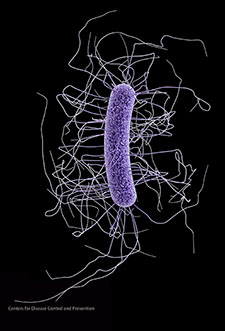Office of Research & Development |
 |

VA Research Currents archive
July 27, 2016

Most cases of C. difficile occur in patients on antibiotics. A study using 2011 data—the largest to date on the topic—found that the bug caused nearly half a million infections in the U.S. that year and directly caused some 15,000 deaths. (Illustration: Centers for Disease Control and Prevention)
Yuck.
That might be the first thought some people have when they hear about fecal transplants. The procedures are increasingly being used in the U.S. to combat Clostridium difficile infections.
But for those actually struggling to rid themselves of C. difficile—which often involves severe diarrhea and overwhelming fatigue—the yuck factor involved with fecal transplants might be the least of their concerns. That's according to new research by a team with the William S. Middleton Veterans Hospital and the University of Wisconsin-Madison.
The researchers, led by Caroline Zellmer, interviewed 17 patients who had been infected with C. difficile and received a fecal transplant. They shared their views on the illness itself, and the treatment.
The findings appeared in the June 2016 issue of the journal Infectious Diseases and Therapy.
"Overall," wrote Zellmer and her coauthors, "patient responses reflected an overall acceptance of [fecal microbiota transplantation] as a treatment to rid themselves of C. difficile infection."
In other research, the treatment has shown a success rate of 85 percent or better.
One possible barrier for patients in need of fecal transplants is the requirement that they find a stool donor on their own. This could potentially involve some uncomfortable conversations. But even on this count, most of the people surveyed said finding a donor was not difficult and they preferred to select someone on their own—usually a spouse, relative, or friend—rather than have their health care provider choose one.
Just the same, the researchers believe that the establishment of nonprofit stool banks that would do away with the need for patients to find their own donors would be a welcome development. They say it would lessen the social and emotional burden on patients.
How about handling fecal material? While some patients are treated in a clinic, with the fecal matter being delivered into the intestine via a colonoscopy or other means, others self-administer it at home. This means they must handle enemas containing the brown stuff, or in some cases freeze-dried capsules that they swallow.
Even this aspect was tolerable to most of the patients surveyed, despite the odor and appearance of the remedy. They made comments like "[you] got to get it done" and "if you need something it is OK."
According to the study authors, "These comments reflect the extent to which patients were desperate for a solution to their struggles" with C. difficile infection.

Fecal transplants can be administered via capsules, among other methods. (Photo: ©iStock/Geo Martinez)
Fecal transplantation, or fecal microbiota transplant, involves removing stool, which contains healthy bacteria, from a donor and inserting it into a sick patient. The procedure actually dates back thousands of years, to ancient China. It has been revived in the past few years as a weapon against the C. difficile superbug, which is notoriously tough to banish.
In a healthy person, the bowels are full of healthy bacteria. Antibiotic treatment can upset the balance and allow C. difficile bacteria to take hold and spread. The germs cause diarrhea—often severe—along with abdominal pain, weakness, fatigue, and other symptoms. The illness often brings with it distress, anxiety, and depression. Repeated hospitalizations, malnourishment, and dehydration are common. In some cases the infection can be fatal. In 2013, the Centers for Disease Control and Prevention placed C. difficile into its top threat category: urgent.
The most common treatments are the antibiotics metronidazole and vancomycin, but a quarter of patients treated with these drugs experience one or more recurrences.
A 2015 review study by VA investigators in Minneapolis found that fecal transplantation, by and large, is an effective method for battling stubborn C. difficile infections.
The review looked at two randomized control trials and an additional 33 uncontrolled case series studies or case reports. Overall, the studies involved data from more than 500 patients with C. difficile. Fecal transplants proved successful in treating 85 percent of patients with recurring infections. They helped 55 percent of patients who weren't responding to standard drug treatments. For initial infections, or those cases deemed "refractory" (non-responsive to treatment), success rates were more variable.